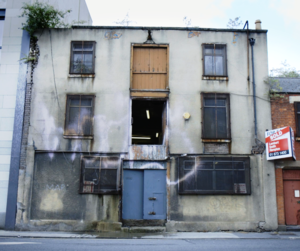First established in 1970, Dot Binding is the last in a long tradition of textile factories and warehouses that occupied the Dublin 8 area of the city since 1760. The current owners have been a rich part of the community, employing men and women locally and throughout Dublin's inner city. On the 2nd June 2017, the building was sold, the doors closed for the last time, and it currently awaits demolition. To mark this event artist Glenn Loughran, in collaboration with the Robert Emmet Community Development Project has initiated a long term collaborative artistic research project: After the future...of work.
After the future...of work represents the first phase of artistic research around the shifting relations between modes of production and modes of exchange in the 21st century. From the impact of generalised automation on work/employment, to peer 2 peer communities emerging through digital culture, 'After the future...of work' aims to link communities and universities around the question of the future of work in an automatic society.
Supported by a CAPP/CREATE commission and with PARITY STUDIOS/UCD, the second phase of the research will be realised in 2018.
Initial research on the project began in February 2017. Working with local businesses, the local community, artists and academics, the first stage of the project was spent in the sewing factory, photographing and collecting remnants from the machines, talking to ex-sewing factory workers about their relationship to work and reading around the history of textile modes of production. On the 9th June the first public event took place in the factory; INTERMITTENT: A COMPOSITION FOR SOLO CELLO with musician Eimear Reidy. This event became the basis for organising a series of local history workshops with ex-sewing workers and labour activists in the area. Through drawing and stitching workshops using archival photographs from the history of the textile industries and specifically the International Ladies' Garment Workers' Union (ILGWU), the groups engaged with the past/present/future of work.
From the 21st August – 25th of September, a mid-point exhibition will be opened to the public, involving, commissioned work, collaborative work and conceptual work that reflects industrial and post-industrial themes in one of Dublin’s most disadvantaged communities. The exhibition engages with theses themes through four key events:
> Intermittent
Film of a specially commissioned composition by cellist Eimear Reidy played from the sewing factory doors. INTERMITTENT: A COMPOSITION FOR SOLO CELLO is a fifteen-minute reflection on the history of industrialisation.
> Union Banners
Developed in collaboration with textile artist Dee Harte through a series of history workshops with local ex-factory workers, a number of union banners were designed and fabricated out of materials from the factory. The banners represent a performance of protests yet to come. Reflecting on the future of work in an automatic society, the banners will be hung on the windows of the RECDP on the 21st September.
> Object Archive
Working in collaboration withUCD engineer James Carron an installation of repurposed 3d printers have been installed in the community centre. Each printer will be coded to wrap and unwrap a single machine fragment from the factory in thread from the factory, for eights hour per day. The wrapped objects will form a permanent archive of industrial objects in the community centre reception area.
> Conference
After the future…of work seminar on the 25th of August from 10.00 – 5.00 was a crucial part of the exhibition, which sought to create a public discussion around the future of work and the new modes of exchange emerging within this shift. It was an opportunity for the Robert Emmet CDP to reflect on an increasing employment gap emerging in the current economy, and its implication for future generations.
. . . .
Robert Emmet Community Development Project
The Robert Emmet Community Development Project works in Dublin’s South West Inner City. The community project is a grass roots organisation with a small local independent board of directors. There are 3 members of staff at over 20 volunteers. The project takes its name from the historic role the area played in the life of Robert Emmet. He used the Marshalea as an arsenal before his execution in 1803 at the top of Bridgefoot Street.
The aim of the project is to be a resource in the area for families, young people and adults to support a healthy, sustainable and thriving community. Robert Emmet Community Development project work closely with a number of other community organisations, businesses and local people in the day to day work and is a founding member of Dublin’s Inner City Community Co-operative. Robert Emmet Community Development Project moved in January 2015 to a new premises on Ushers Street in Dublin 8. Previously the project spent almost 10 years renting space from the Mendicity Institution on Island Street. The premises on Ushers Street was vacant for almost a decade before Robert Emmet Community raised over €150,000 to finish and fit out the space on Ushers Street, providing 200m² for community activities. The project is funded through the Department of the Environment, Community and Local Government and through the Department of Children and Youth affairs. Other costs and overheads are met through fundraising and grants.

